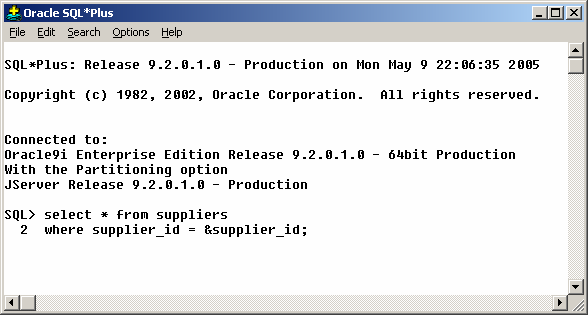
This includes the expression, search, and result arguments. Question: Is there a limit to the number of arguments that you can have in one DECODE statement? I’m getting an error, “ORA-00939: too many arguments for function”.Īnswer: Yes, the maximum number of components that you can have in a decode function is 255. If yrs_of_service = 1 and 5 then return 0.06Īnswer: You will need to create a formula that will evaluate to a single number for each one of your ranges.ĭecode(trunc (( yrs_of_service + 3) / 4), Question: I need to write a decode statement that will return the following: The formula will evaluate to 2, if the supplier_id is between 21 and 30. The formula will evaluate to 1, if the supplier_id is between 11 and 20. The formula will evaluate to 0, if the supplier_id is between 1 and 10. However, you can try to create a formula that will evaluate to one number for a given range, and another number for the next range, and so on. Question: I would like to know if it’s possible to use decode for ranges of numbers, ie 1-10 = ‘category 1’, 11-20 = ‘category 2’, rather than having to individually decode each number.Īnswer: Unfortunately, you can not use the decode for ranges of numbers.

Sales BonusesĭECODE(SIGN(actual-target), -1, ‘NO Bonus for you’, 0,’Just made it’, 1, ‘Congrats, you are a winner’) The SIGN/DECODE combination is also helpful for numeric comparisons e.g. 1 I am trying to use DECODE in PL/SQL statement (for sample HR schema) but I got this error: ''The number specified in exact fetch is less than the rows returned'' This statement got a DEPARTMENTID from the user, compare it with a decode section, and shows where is that department located. The Decode function compares one expression to one or more other expressions and, when the search term is found, returns the match result. The date example above could be modified as follows:ĭECODE(SIGN(date1-date2), 1, date2, date1) The maximum number of components in the DECODE function, including expr, searches, results, and default, is 255. If expr is null, then Oracle returns the result of the first search that is also null. Helpful Tip: One of our viewers suggested combining the SIGN function with the DECODE function as follows: In a DECODE function, Oracle considers two nulls to be equivalent. The formula below would equal 0, if date1 is greater than date2: Otherwise, the decode function should return date1.Īnswer: To accomplish this, use the decode function as follows:ĭecode((date1 – date2) – abs(date1 – date2), 0, date2, date1)

#Oracle plsql decode how to
Question: One of our viewers wanted to know how to use the decode function to compare two dates (ie: date1 and date2), where if date1 > date2, the decode function should return date2. The decode function will compare each supplier_id value, one by one. This package also helps in converting the chunk files into more organized parts of the UTLFILE package.

The above decode statement is equivalent to the following IF-THEN-ELSE statement: The UTLENCODE package was introduced in the Oracle release version 9i for encoding and decoding the raw data, primarily the body of an email message, while transmitting them between the hosts.


 0 kommentar(er)
0 kommentar(er)
